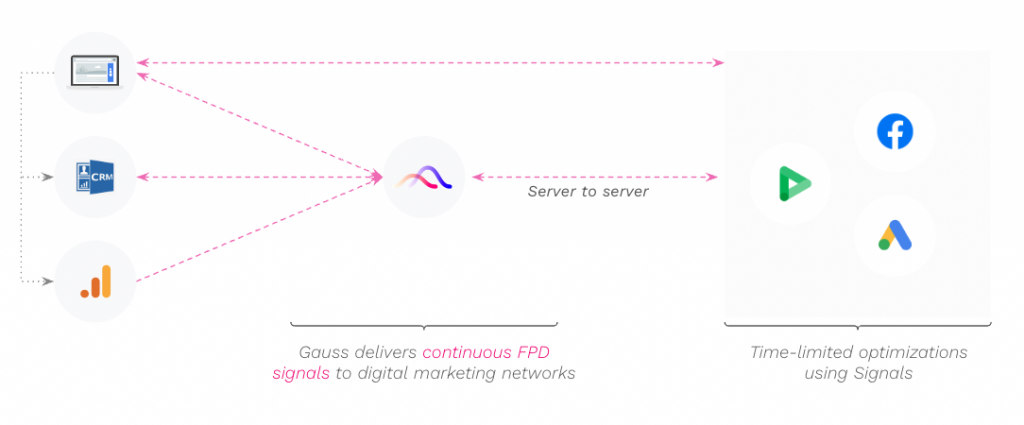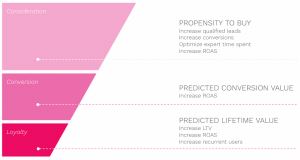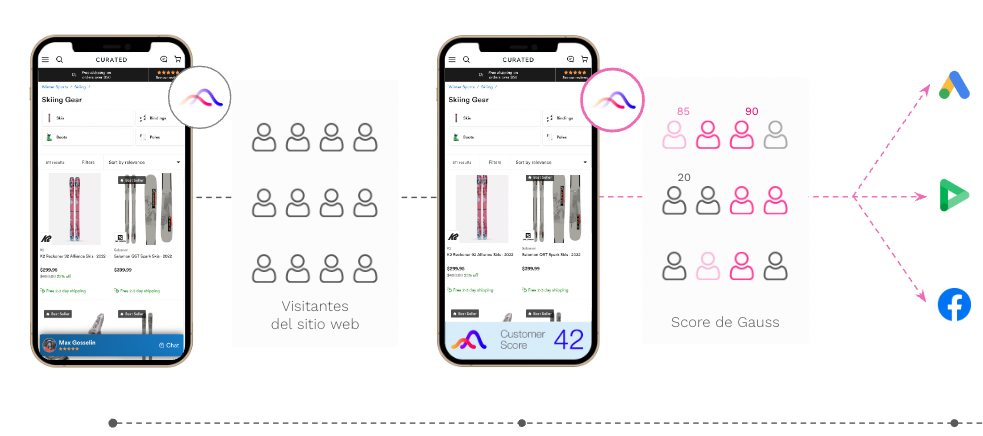Align your advertising investment with your business strategy
The automatic bidding strategies offered by the different advertising platforms have become one of our best allies when it comes to campaign optimization. Specifically, those known as Value Based Bidding allow us to align our advertising investment with our business objectives in an automated way.
If you are using Value Based Bidding, simply configure your pixels so that they collect the conversions that you want to optimize. Then, indicate the objectives you want to achieve through your campaigns (whether it is maximizing the value of the conversions or optimizing the return on our investment). From there, algorithms take care of learning everything necessary to find and bid for users to achieve your goals.
The main issues with Value Based Bidding
Conversions, in this case, act as signals that tell the algorithm whether or not users are valuable for our campaign. But, sometimes you may not have enough conversion volume for VBB to work. And sometimes, web conversions do not fully reflect the reality of our business.
Furthermore, it is estimated that the Google and Meta algorithms only consider signals for the first 7 days since the user entered through a paid campaign. For user acquisition data, the most recent signals are the ones that the algorithms give the most importance to. What happens when a lead’s final conversion takes place beyond that 7-day window?
How Gauss Smart Advertising can help you
To cover this gap between what the algorithm is able to see and the real objectives and KPIs of your business, Making Science developed Gauss Smart Advertising. This is a proprietary technology that allows you to anticipate the future value of a user and improve signals throughout the entire sales funnel. With Gauss, we can predict a lead’s propensity to buy, the expected purchase value, and even the long-term value of the lead (customer lifetime value). Then, we translate it into signals that provide the algorithm with a more realistic vision of your business. Furthermore, what makes the difference is that we not only create predictive models, but we can activate them in real-time to anticipate and communicate those signals without losing the benefits of the cross-device, nor the freshness that Smart Bidding algorithms require. Additionally, we develop agnostic models that can be activated on any of your marketing platforms.
How it works
Advertising platforms have the ability to collect web browsing data for campaign optimization. Gauss Smart Advertising collects browsing data, but also from other data sources to issue a more accurate assessment of the user that it then sends as a signal to the platforms.

In essence, based on previously trained machine learning models, it predicts and issues a score/value for each of the users that enter the website and communicates it to the platforms in real time:
A methodology for automation and activation
Our solution is optimized to cover all the critical phases of its implementation, from the collection and evaluation of the quality of the data that feeds our models to the activation and monitoring of campaigns and models:

With Gauss Smart Advertising we have managed to increase our clients’ conversions by 20% and reduce their CPL/CPA by up to 50%.
Gauss Smart Advertising can be used to
- Communicate to the algorithms that someone has made a purchase when the lead is more than 7 days old (for example, longer tail conversions like university enrollments, vehicle purchases in the automobile industry, insurance or mortgage purchases in the banking sector, etc.)
- Adjust conversion values when refunds and cancellations represent an important part of the business and these occur outside the scope of action of the algorithms (example: in the hotel industry where cancellations tend to take place closer to check-in than to reservation)
- Amplify and provide a greater volume of signals to the algorithms in order to improve their performance in industries or advertising channels (for example, display) where few conversions are collected
- Adjust the signals captured by the algorithms to the KPIs and business objectives (for example, increase customer lifetime value for e-commerce businesses)
Do you want to know more about Gauss Smart Advertising? Write to us! Our team of experts will be happy to help you.









 Cookie configuration
Cookie configuration